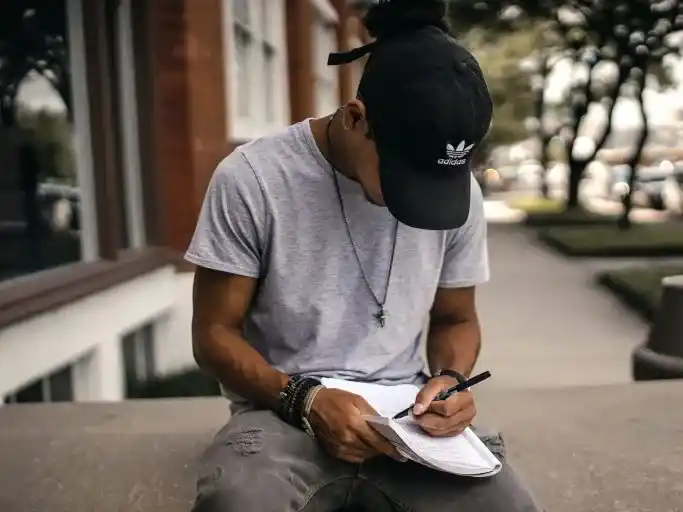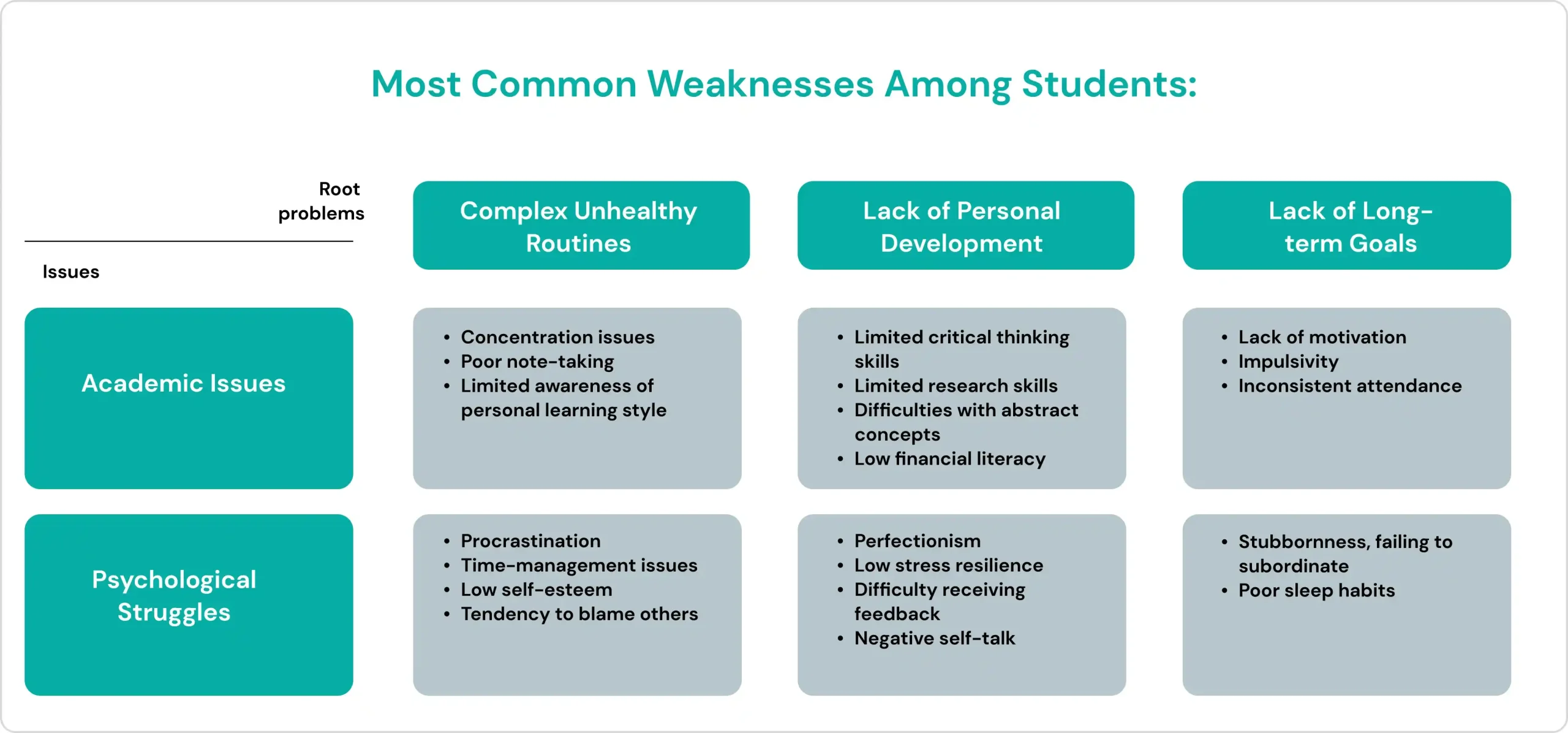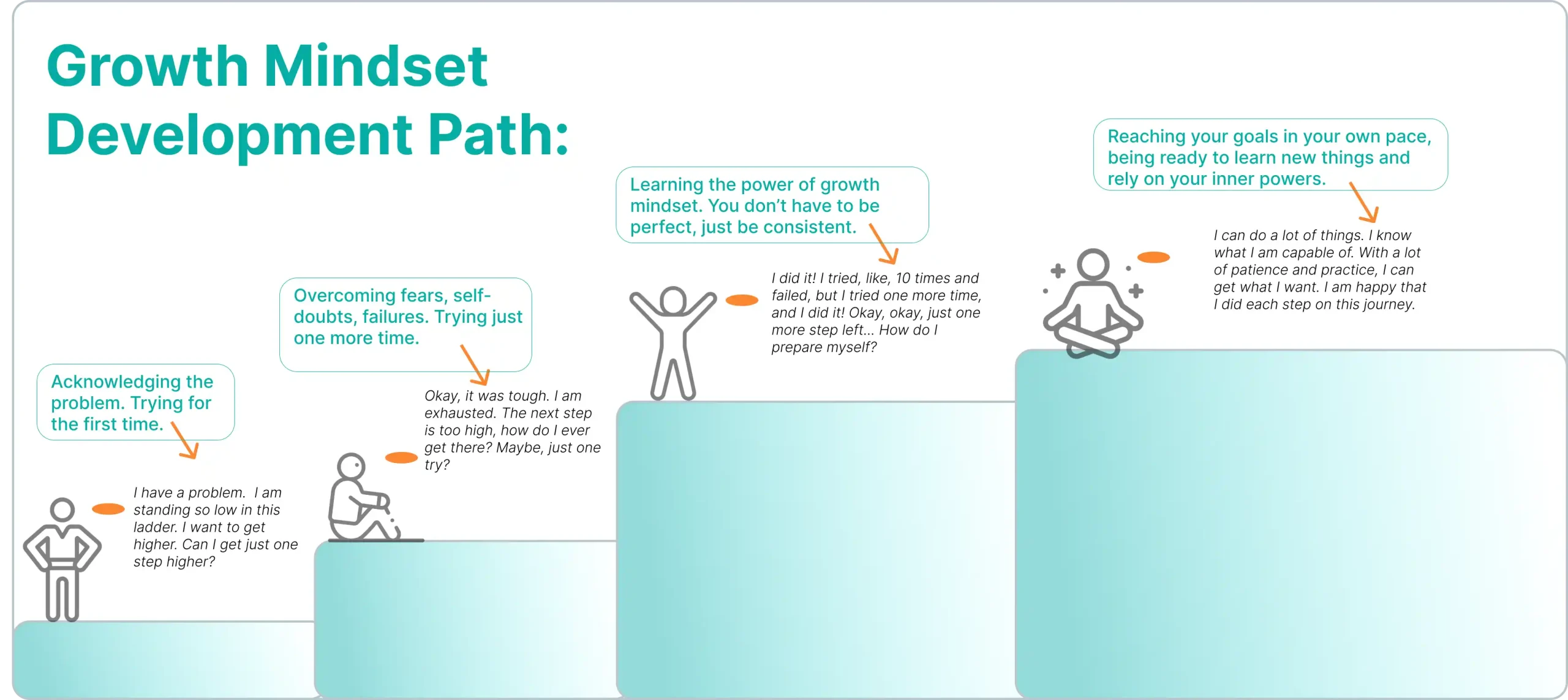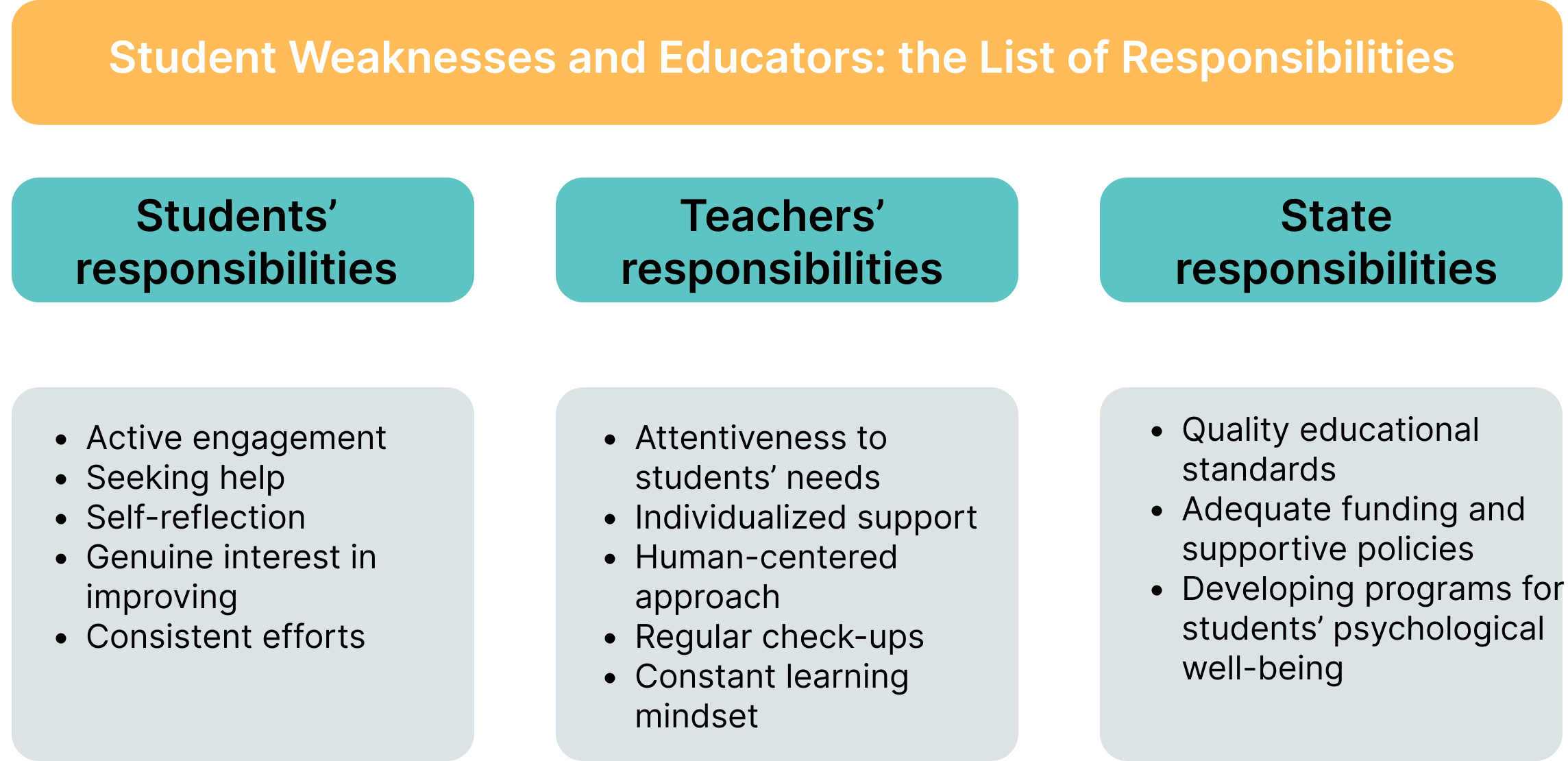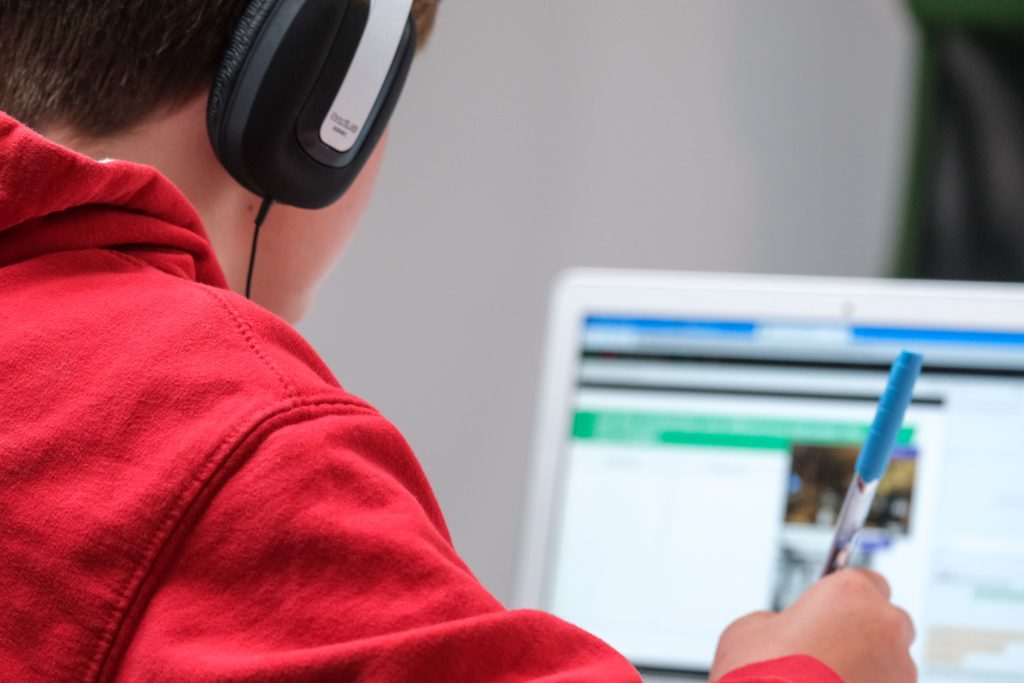Are you familiar with a situation when you know exactly what is wrong with your learning path but still cannot change a thing? Have you ever felt helpless while having all the instruments for improvement? Yeah, we all have been there. But here is the possible resolution you need: you see the fragments of problems without seeing the whole picture. To break free from being the squirrel in the wheel, you must honestly name, face, and embrace your weaknesses as a student. If you’re struggling to manage your academic workload, consider utilizing our custom annotated bibliography writing service to help organize your research materials effectively.
Managing your coping mechanisms, resilience skills, and learning difficulties will bring more consciousness into your daily choices. This article will help you see your student weaknesses clearly and develop effective self-improvement strategies.
An Overview of Student Weaknesses: How to Understand Which Weaknesses You Have
We don’t want to throw some common weaknesses on you and call it a day. Let’s do it strategically. Let’s see what YOU think your personal weaknesses are before comparing them to the common ones.
The main problem with students’ weaknesses is that they are usually complex. Academic weaknesses intervene with psychological issues and the lack of self-management. As a result, the student is overwhelmed and lost in all challenges.
For more comprehensive assistance, our custom case study writing service offers tailored support to address specific academic challenges.
A student’s guide to identifying personal weaknesses
What are your weaknesses as a student? Here are some questions to find that out (they may not be what you think):
- Do you have an approach to overcoming challenges? Do you have a plan on what to do if everything goes wrong?
- Can you name five of your constant academic struggles? Why do they continue happening? Are there any background classroom challenges or personal issues behind these struggles?
- Are there any patterns and clusters of your academic struggles? Can you categorize them?
- Have you tried any self-improvement strategies yet? Did something work? If not, why do you think that happened?
- Are your weaknesses related to studying itself, time or resource management, or psychological issues?
Now, you can go straight to reading the next header. Or you can take this possibility as a life-coach session, take a piece of paper, and answer the questions above.
The three most common weaknesses among students
However untypical it is, the most common of students’ weaknesses are not academic struggles. Students suffer most from the lack of self-awareness to overcome challenges. Here is how that issue manifests:
- Students fall into complex, unhealthy routines. First, the student typically skips a meal. Then, he (or she) manages to operate on two hours of sleep daily. Later, psychological struggles appear as a result of poor personal health care. Finally, all these challenges result in academic struggles. Congrats, the student now has four global intertwined problems with little chance to untangle this knot.
- Students concentrate on academic growth, ignoring personal development. Taking care of your soft skills and self-management is much more important than caring about remembering the information. The paradox is that you can’t learn efficiently if you don’t learn how to learn first.
- Students value short-term benefits over long-term ones. What is common for the chronic party-head who misses half the classes and a student working around the clock with no life whatsoever? They both will face the consequences of poor life balance quickly. No matter what side of the scale you are on, long-term goals win the race.
When you think of student weaknesses, these three are probably not the first to come to your mind, right? But here is how more well-known challenges arise in these three issues:
Recommended reads
How Common Student Weaknesses Influence Academic and Personal Life
It is not rocket science to conclude that the lack of personal development, classroom challenges, and learning difficulties do not contribute positively to anything at all. However, students may not associate diverse problems with their weaknesses. Hence, the most common causal relations between weaknesses and their influence are as follows.
Academic consequences of untreated student weaknesses:
- Constant, repetitive, and specific academic issues. For instance, if all of your teachers highlight your lack of attention, you probably have a problem to work with.
- The development of secondary problems and unhealthy coping mechanisms. For example, your weakness is note-taking. You may treat it by asking your classmates to check your notes each time instead of working on your skills. Now you have two problems: poor note-taking AND dependence on others.
- Severe decrease in grades, overall performance, and academic excellence. Naturally, if you let your weaknesses grow bigger, they do. And they will take over the place in your mind reserved for your achievements and personal development.
Weaknesses in students impact their psychological well-being
It’s not rocket science to figure out that negative academic consequences lead to increased psychological issues. Here are just a few of them:
- Lower self-esteem, feeling like a failure
- Highly increased stress and anxiety. These two progress to depression in extreme cases
- Inability to cope with new challenges, falling behind in all life areas
- Decreased student resilience to illnesses, decreased immune system regulation
- The lack of energy to work for the improvement of the situation
How to Overcome Student Weaknesses: Best Strategies to Try
Case studies for your inspiration: overcoming academic weaknesses
- Case #1. Erin Gruwell and Freedom Writers
The original story differs a little bit from the retelling. However, both the film and the real story of Freedom Writers tell a lot about the role of education and overcoming weaknesses. Sometimes, our weaknesses are not our fault. Sometimes, we become trapped in situations we did not choose. But there is great hope in the fact that our weaknesses are also our biggest strengths once we overcome them. The case of Freedom Writers teaches that one way of overcoming challenges as a student is to seek your voice.
- Case #2. Ieshia Champs, the mother of 5, graduated from law school with honors
Students’ development is always influenced by their upbringing, life experiences, and the examples they see through their lives. Ieshia Champs can be a motivation and inspiration for those who don’t have such valuable positive examples to look for. She is the person who knows what it is like to be homeless, to have kids at an extremely young age, and to see substance abuse all around you. Yet, while not having enough support for herself, Ieshia provides that support for her kids. Her oldest son David says he is inspired by her example, and so you can be, too.
One more strategy to overcome your weaknesses is to become the inspiration you so desperately need. If there is no education support around you, seek it in other places, search for it, and promise yourself to make it to the better life you deserve.
- Case #3. Alfonso Gonzales and students’ common, natural limitations
Some students believe that there is something inherently wrong with their learning abilities. They believe they have inherently poor memory, low IQ, lack of concentration, or other learning difficulties. Do you know how, with age, cognitive functions naturally become less adaptive and efficient? Well, that did not stop the WWII veteran from becoming the oldest college graduate at the age of 96. The third good strategy to overcome challenges is to try just one more time each time you feel like giving up. Give yourself some time and grace, accept your weaknesses and reality as it is, and then try once again to beat these learning difficulties.
The best way to combat weaknesses is a growth mindset
One of the most important points that connects all these stories is the growth mindset. Acknowledging weaknesses contributes to students’ growth significantly. The most crucial support you will ever need afterward is the acceptance and readiness to work on your issues. Work with yourself, not against yourself. Here is how that works:
How to Balance Strengths and Weaknesses as a Student: Short Guidance
Here is one more point that may help you manage your academic struggles. Along with your weaknesses, you have some strengths, too. The deal is to keep them well-balanced so that your improvement journey will be as smooth as possible.
We asked Cristel Roberts and Akari Saito, medicine and marketing students and regular contributors to our blog, to share their tips on how to overcome academic struggles and develop student resilience to personal weaknesses.
Cristel: When you face your strengths and weaknesses as a student nurse, it helps to remember the neurological perspective. The science says that many of our responses to problems are controlled by autonomous automatic responses. For instance, if I am struggling with a task, it may be because I have some academic weaknesses, or because I was stressed lately, or because I haven’t eaten anything today. Therefore, before blaming myself for another problem with my mind and personality, I go through the basic well-being checklist. It includes typical points like decent sleep, nutrition, physical activity, and hydration. If I can’t check these points, then the problem is not among my weaknesses.
The best strategies students can use to balance their weaknesses and strengths are to do self-reflection and know how their brain and nervous system work.
Akari: For me, the best way to keep my strengths and weaknesses intact is self-reflection. I got the task of writing a self-reflection strength and weaknesses essay when I was a freshman, and this tip stuck with me. I don’t use it for an essay anymore – instead, I change the formats of my bullet journals and diaries sometimes. However, I regularly revise what problems I faced lately, what can be changed, and what I seem to be missing in my growth.
Student Weaknesses and Educators. Who Must Address the Problem?
One more common topic regarding student weaknesses and academic struggles concerns educational support. A supportive and safe environment plays one of the most prominent roles in students’ academic and personal development. Although the responsibility division is quite arbitrary, here is one option of what each party can do to ensure the best results:
FAQ: So, What Are the Lessons?
1. What are common weaknesses among students? The most common weaknesses among students are procrastination, lack of concentration, negative self-talk, perfectionism, and lack of motivation. These issues come from three more global student struggles: unhealthy routines, lack of personal development mindset, and the absence of long-term vision.
2. How can students overcome their academic weaknesses? To overcome their academic weaknesses, students must learn to self-regulate and self-reflect first. You name and face your demons first, then you slay them.
3. What role do educators play in helping students with weaknesses? Educators play an important role in creating a safe environment for the student’s growth. Educators and institutions can not fix students’ problems, but they can cover basic needs so that students have more energy to fix their academic struggles.
